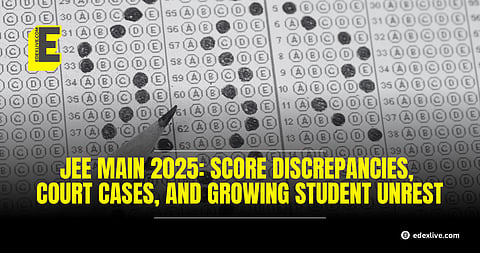

The ongoing controversy surrounding the Joint Entrance Exam (JEE) Main 2025 results has taken a serious turn after the Delhi High Court acknowledged a possible systematic error.
What began as scattered complaints from students about fluctuating scores and missing responses has escalated to a systemic-level investigation ordered by the Delhi High Court. With the National Cyber Forensic Laboratory (NCFL) now tasked to audit the National Testing Agency’s (NTA) backend systems, the issue has raised serious concerns about the reliability of one of India’s largest and most sought-after exams.
Now, the students are worried that this issue might be much larger than they had initially expected, seriously hampering their trust in the exam conducting agency.
So what exactly happened?
Discrepancies in scorecards
A number of JEE Mains aspirants, this year, found their official scorecards inexplicably altered shortly after downloading them.
Sharing his experience in a conversation with EdexLive, one student revealed, “I had downloaded my original scorecard from the official NTA portal soon after the results were declared. When I opened the portal again an hour later, the percentile had dropped significantly, affecting my rank and eligibility for JEE Advanced. My name, roll number, and other details remained the same, but the score was notably different.”
Other students reported blank response sheets or observed that the number of attempted questions had mysteriously decreased compared to their actual exam submissions.
Missing grievance redressal mechanism
Aspirants further highlighted that the NTA has not provided any official way for other affected students to report discrepancies.
Despite numerous complaints submitted through NTA’s helpdesk, affected students say the agency’s responses have been generic and dismissive.
“I emailed NTA with attachments showing both versions of my scorecard. Their reply was a standard statement saying my marks were as per NTA records, without acknowledging the discrepancy or offering any escalation process,” said the student.
Currently, there is no official system for verifying or validating downloaded documents after result publication, leaving students helpless and confused.
Legal proceedings so far
Two separate petitions in the Delhi High Court, one filed by Anusha Gupta and another by Shashank Pandey, raised similar concerns about unexplained changes in their JEE Main results, including altered percentiles and missing or blank response sheets.
Recognising the similarities and potential larger implications, the court clubbed both petitions.
On May 14, the court condoned a brief delay in filing crucial electronic evidence and ordered the seizure and forensic examination of the laptops and digital records related to the NTA’s result processing system.
The Delhi HC has even hinted at a possible systemic failure rather than isolated technical glitches.
“The nature of the allegations, if true, may not be isolated instances... It is necessary to determine whether the issue stems from backend or network-level tampering,” the court said on May 20.
Following the refusal of the Central Forensic Science Laboratory (CFSL) to conduct the investigation, the court escalated the matter to the National Cyber Forensic Laboratory (NCFL), India’s premier cyber forensic agency under the Ministry of Home Affairs’ I4C initiative.
NCFL has been tasked to conduct an exhaustive audit of the NTA’s backend systems, including metadata, audit logs, and server behaviour, and submit a forensic report by May 29.
A bigger issue?
It was initially assumed that the JEE Main 2025 score discrepancies were limited to a handful of students who noticed something was wrong. However, affected students now worry that the problem is far more extensive.
“There could be hundreds or even thousands of students who may have scored higher than what the scorecards currently say, had missing or altered attempts in their response sheets, or were simply unaware that something could be wrong,” added a JEE 2025 aspirant.
What do students want?
Affected students are now demanding a fundamental overhaul in how exam results are handled.
Their key demands include the establishment of a transparent grievance redressal system that allows discrepancies to be reported and tracked effectively.
They also call for the availability of audit trails and logs related to score generation in a manner that is both secure and accessible to stakeholders. Another crucial demand is the introduction of independent third-party verification of exam systems to ensure fairness and prevent manipulation.
“Most importantly, I want the system to stop pretending it is flawless. Transparency and accountability are the only ways to regain student trust,” said one aspirant.
